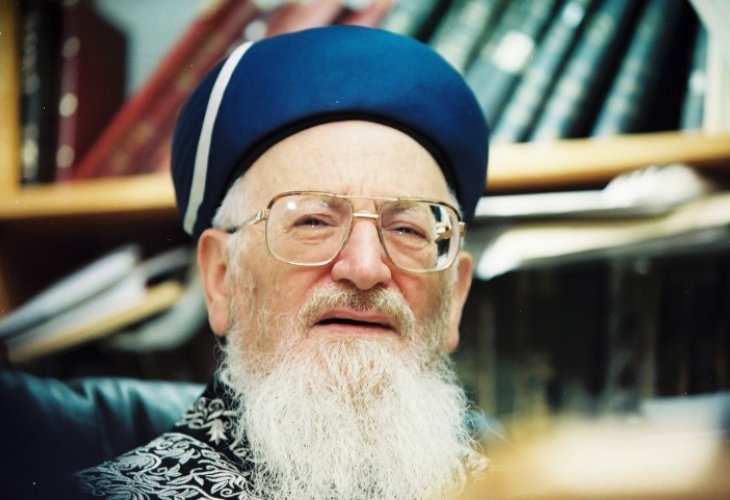A Glimpse Into the Heavenly Realm: The Story of Rabbi Mordechai Eliyahu
In memory of Rabbi Mordechai Eliyahu zt"l, a spiritual pillar for Torah and the Jewish people. Who was Rabbi Eliyahu truly? Here's what you might not know, but need to.

Rabbi Mordechai Eliyahu was born in the month of Adar 1929, in the Old City of Jerusalem. His parents were highly esteemed individuals: His father, Rabbi Salman Eliyahu zt"l, was one of Jerusalem's leading kabbalists who immigrated from Baghdad under the instruction of his mentor, the 'Ben Ish Chai.' His mother, Mazal, was the sister of Rabbi Yehuda Tzadka and the granddaughter of Rabbi Yosef Chaim's sister. Despite his father's profound influence, Rabbi Eliyahu faced significant challenges when his father passed away when he was just 11. The family lived in deep poverty, yet nothing deterred the young Mordechai's dedication to Torah study. Over time, he became one of Israel's great rabbis.
In his youth, Rabbi Eliyahu engaged deeply in Torah study and served under the tutelage of major scholars of his era, including Rabbi Ezra Attia zt"l, head of Yeshivat Porat Yosef, Rabbi Tzadka Hutzin zt"l, and Rabbi Avraham Yeshayahu Karelitz zt"l (the Chazon Ish). He was closely associated with Rabbi Yitzhak Nissim, the former Sephardic Chief Rabbi of Israel, prior to Rabbi Ovadia Yosef, and maintained a close relationship with the 'Elder Kabbalist,' Rabbi Mordechai Sharabi, and the Baba Sali – Rabbi Yisrael Abuhatzeira. He also traveled several times abroad to meet with the Rebbe of Chabad, Rabbi Menachem Mendel Schneerson (the Rebbe of Lubavitch), maintaining warm relations with Chabad afterward.
As he matured and entered the yeshiva world, Rabbi Eliyahu received his rabbinical education in several places, including Yeshivat Porat Yosef with Rabbi Ezra Attia, who was Rabbi Ovadia Yosef's mentor. He excelled at the rabbinical and judges' school of Rabbi Yitzhak Nissim zt"l. Not long after, he became Israel's youngest dayan, sitting on the Be'er Sheva Rabbinical Court. He dealt with complex personal issues, including the matters of agunot. Four years later, he was appointed to the Jerusalem Regional Rabbinical Court and five years later to the Great Rabbinical Court. As a dayan, he forged strong connections across all segments of Israeli society. People from Israel and around the globe consulted him on personal and halachic issues. His popularity and compassion eventually led to his election in 1983 as the Chief Rabbi of Israel, serving alongside Rabbi Avraham Shapira until 1993. Rabbi Eliyahu dedicated himself to bringing distant Jews closer, often traveling to far-flung kibbutzim and communities to connect with them and discuss Jewish identity and faith. He visited Jewish communities worldwide, emphasizing leadership and battling assimilation, urging Jews living abroad to immigrate to Israel. Occasionally, he visited Jonathan Pollard in his U.S. prison.
After retiring from his position as Chief Rabbi, Rabbi Eliyahu became a spiritual leader for the national religious community, alongside Rabbi Avraham Shapira. He gained many followers who sought his wisdom. In halacha, he often ruled according to the 'Ben Ish Chai,' akin to the customs of Iraqi Jews, from where his father originated, occasionally integrating elements from Kabbalah, particularly the teachings of the Ari. Known for his stringent rulings, some saw him as a miracle worker who brought salvation in seemingly impossible situations.
Rabbi Eliyahu led the prominent 'Darchei Hora'ah' Kollel in Jerusalem, intensifying his educational efforts. He also headed the 'Legacy Fund,' establishing yeshivot and study centers. His weekly synagogue lessons in Kiryat Moshe, Jerusalem, were sought after and broadcast globally via satellite, later published in the weekly 'Kol Tzofayich' newsletter.
Rabbi Eliyahu zt"l's life is filled with remarkable stories. One such tale, verified by a trustworthy source, tells of a man who experienced a near-death encounter. In the heavenly court, he observed distinguished rabbis, but was surprised to see Rabbi Mordechai Eliyahu, identifying him as his contemporary. Lacking a single mitzvah for acquittal, the man, a young family man, pleaded for another chance at life. Amid a solemn silence, Rabbi Eliyahu stood and offered one of his mitzvot to the man, allowing him to return to life. Awoken days later and vividly recalling the episode, the man rushed to Rabbi Eliyahu's office. Before he could speak, Rabbi Eliyahu, deeply moved, recognized him, exclaiming "How difficult it was to save you!"
This story is but one of many. During his last two years, from his sickbed, Rabbi Eliyahu continued writing Torah insights, responding to numerous queries, and issuing halachic decisions. His endeavors continue through his children: Rabbi Shmuel Eliyahu, a member of the Chief Rabbinate Council and Rabbi of Safed, and Rabbi Yosef Eliyahu, head of 'Darchei Hora'ah.'
At the start of the week, on the 25th of Sivan 2010, this righteous individual returned his pure soul to his creator. His passing is an unparalleled loss to the Jewish people. We pray he continues to be a strong advocate for us from his heavenly seat, and that more like him may bless Israel. May his soul be bound in the bond of life, Amen.

